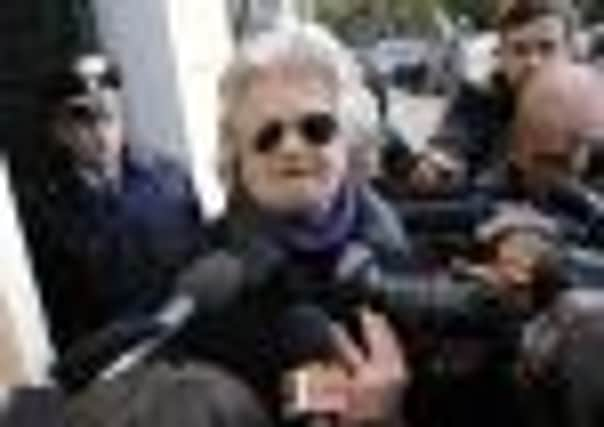Italian elections: Voters send the euro plummeting


As final results from Monday’s voting pointed to paralysis in the Italian senate, stock markets around Europe fell, with the Milan bourse losing 5 per cent and banks exposed to Italy’s huge debt losing 10 per cent.
As the euro tumbled to its lowest point against the dollar since early January, German politicians urged Italy to stay on the reform path, while one analyst called Italy’s election result, combined with its crumbling economy, a “toxic mix”.
Advertisement
Hide AdAdvertisement
Hide Ad“Markets are likely to ratchet up the pressure on Italy to find a stable and working political solution to allow a resumption of its economic liberalisation reform agenda,” warned Raj Badiani, an analyst at HIS Global Insight.
After attacking the austerity programme imposed by outgoing prime minister Mario Monti, former premier Silvio Berlusconi mounted a surprise comeback in Monday’s election.
Despite being written off following his resignation in 2011 as Italy’s €2 trillion debt pile edged his country and Europe towards financial meltdown, the 76-year-old media mogul beat Pier Luigi Bersani’s centre-left coalition to take a lion’s share of seats in the senate, but not enough to reach a majority.
Bersani narrowly beat Berlusconi in the lower house by less than half a per cent to pick up a winner’s bonus which gives him a majority.
The centre-left, which was widely tipped ahead of the election to form a reform-minded government with Monti, lost ground to comedian Beppe Grillo’s Five Star Movement, which received more votes in the lower house than any other single party and will send an army of 108 MPs and 54 senators into parliament, none of whom have national political experience.
“This is a war between generations,” said Grillo, who campaigned against political corruption, refused state funding for his campaign, built his movement on the loyal following of his blog and took around onequarter of all votes cast.
Grillo ruled out becoming a king-maker in a new government, saying he would refuse to forge alliances with other parties.
Mr Berlusconi hinted yesterday that his Freedom People party could be open to a broad coalition with Bersani’s Democratic Party, which could calm the markets, but centre-left officials were wary of the offer.
Advertisement
Hide AdAdvertisement
Hide AdGrillo was dismissive, claiming: “The Democratic Party and the Freedom People together will last seven or eight months, no more.”
Bersani’s officials were meanwhile putting out feelers to Grillo for his support for a limited programme of legislation to tackle corruption and push on with economic reforms before returning to the polls.
Asked about Grillo, Bersani said yesterday: “Now it is up to him to say what he wants to do.”
The hung parliament will need to meet to elect a new Italian president, since the incumbent Giorgio Napolitano must step down in May.
The mainly ceremonial role is usually taken by a veteran politician, but yesterday Grillo said he was backing Dario Fo, the Nobel prize-winning playwright who has backed Grillo’s campaign.
Fo, who says he has known Grillo for years, suggested the comedian might be ready to work with the centre-left “to achieve the things Italians have been demanding for years”.
Back to the drawing board go the red-faced pollsters
Italy’s election result not only shocked the political establishment to the core, it left polling companies with egg on their face after they completely failed to predict the messy outcome and the spectacular resurgence of Silvio Berlusconi.
Opinion polls are banned in the last two weeks before Italian elections and the last public ones on 8 February almost all predicted a clear centre-left victory, mostly by around 5 percentage points.
Advertisement
Hide AdAdvertisement
Hide AdPrivate conversations with several pollsters after that date and right up to the election suggested the centre-left had hung on to enough of a lead to still clearly win the election, with majorities in both houses of parliament. The actual result was very different. The centre-left of Pier Luigi Bersani won the lower house vote by less than 1 percentage point, although it benefited from a winner’s bonus to give it comfortable control. However, in the Senate, the rise of populist comedian Beppe Grillo and of Mr Berlusconi, combined with the poor performances by both the centre-left and centrist Monti left Bersani far short of a majority and threw Italy and international markets into confusion.
The instant polls conducted by polling companies immediately after the election also got the result completely wrong, predicting a strong centre-left victory and causing a brief market rally before computer projections based on actual votes began showing the opposite result.
Maurizio Pessato, vice president of polling company SWG, said all pollsters had underestimated the shock comeback by Mr Berlusconi, who mounted an extraordinarily effective campaign after months of indecision.